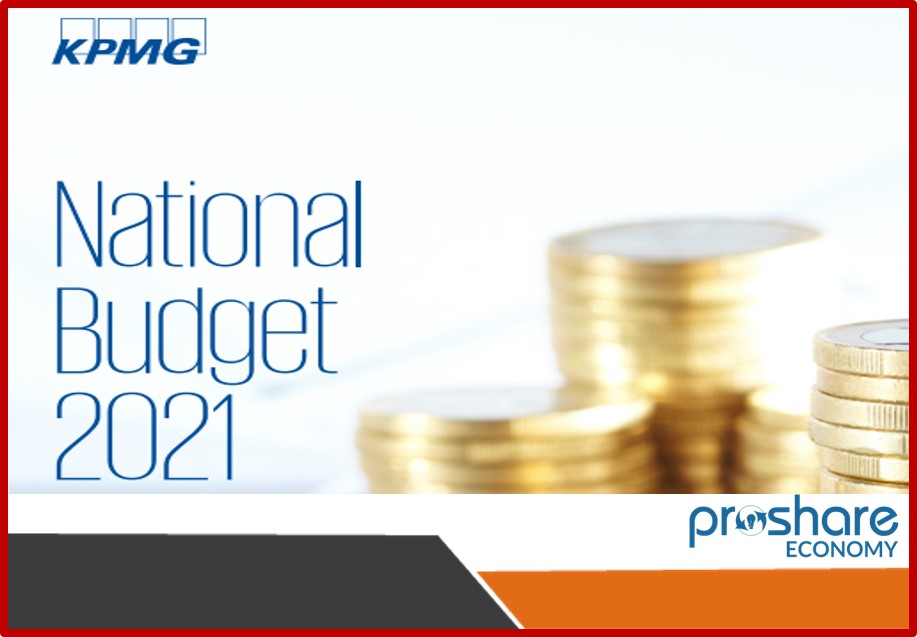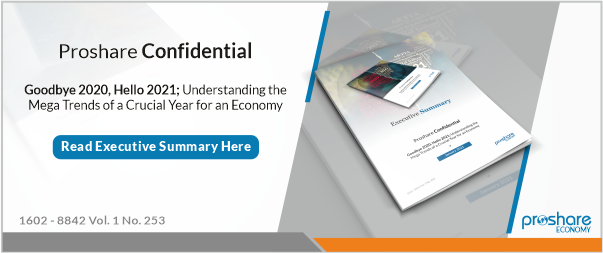Monday, April 26,2021 / 08:47 PM / byWole Obayomi / Header Image Credit: KPMG
Nigeriarecorded a Gross Domestic Product (GDP) growth of 1.87% in the first quarter of2020, keeping pace with its average GDP growth rate of 1.88% over the previous11 quarters. However, the economy was stopped in its tracks in Q2 2020 by theTwin Shocks of the COVID-19 pandemic and the significant reduction in the oilprice.
Atthe end of the 2nd quarter, the Nigerian economy had contracted by 6.1% andthis decline continued in the 3rd quarter of 2020 with a further contraction of3.62% resulting in the economy going into a recession. However, the economyexperienced some respite in the last quarter of the year with a GDP growth rateof 0.11%, which extricated the country from its second recession in five yearsand moderated the annual GDP growth rate to -1.92%. The recovery in the secondhalf of the year was largely due to the positive growths recorded by theAgriculture, Information and Communication, and Financial Services sectors ofthe economy.
Despitethe fall in oil demand in 2020 and the oil production cuts mandated by theOrganization of the Petroleum Exporting Countries (OPEC), Nigeria achieved anaverage crude oil production level of 1.78 million barrels per day (mbpd) in2020. This is close to the 1.80 mbpd estimated in the revised 2020 NationalBudget.
Theoil sector contributed 8.16% to the country's GDP in 2020, according tostatistics published by the National Bureau of Statistics (NBS), while thenon-oil sector contributed the balance of 91.84%.
Thepurchasing power of Nigerians deteriorated in 2020, as inflation remained indouble digits and increased steadily from 12.13% (year-on-year) in January 2020to a three-year high of 15.75% (year-on-year) in December 2020. The rise ininflation is largely attributable to the closure of land borders in 2019 andpart of 2020, the increase in Value Added Tax (VAT) rate in February 2020,COVID-19 induced lockdowns and movement restrictions, rising insecurity and thedepreciation of the Naira.
Despitethe severe economic challenges experienced by businesses, the Federal InlandRevenue Service (FIRS) achieved revenue collection of N4.95 trillion in 20201 . This represents about 98% ofthe tax authority's budgeted revenue and is N0.31 trillion short of the N5.26 trillion it collected in 20192 . We applaud theFIRS' effort in adopting technology to improve tax compliance and collection,which aligns the nation with global best practices and further enhances theease of doing business in Nigeria.
The2021 National Budget has support for economic recovery and growth as its toppriority and focuses on internal generation of revenue and investment incapital infrastructure. The Budget, which was termed the Budget of EconomicRecovery and Resilience, leverages on the 2020 Budget of Sustaining Growth andJob Creation to foster and boost the country's recovery from the impact of theCOVID-19 pandemic.
Asanticipated, the Federal Government (FG) adopted conservative crude oil priceand production benchmarks of US$40 per barrel and 1.86 mbpd, respectively, inthe 2021 Budget, following the fall in oil prices recorded in 2020.Accordingly, there is more revenue generation focus on the non-oil sector ofthe economy.
Oneof the ways by which the FG intends to mobilize non-oil revenues in 2021 isthrough incremental tax reform. The FG has initiated this process with theenactment of Finance Act, 2020 ("the Act") which introduced targeted taxincentives and tax relief measures aimed at cushioning the effect of theCOVID-19 pandemic on businesses and easing tax administration. The Act amendsextant tax laws to align with global best practices, provides furtherclarifications on areas of contention between taxpayers and tax authorities andaids revenue generation for the 2021 Budget.
Itis imperative that the FG achieves or even surpasses its budgeted revenue ofN7.99 trillion in 2021, to ensure effective implementation of the N13.59trillion budgeted expenditure and curtail the country's budget deficit whichcurrently stands at N5.60 trillion (i.e., the equivalent of 3.9% of thecountry's GDP).
Theeffective implementation of the 2021 Budget will also spur economic growth. Thequestion, though, is "How much growth?".
TheFG has projected a GDP growth rate of 3% for 2021 fiscal year, which is doublethe 1.5% projected by the International Monetary Fund (IMF), and higher thanthe 1% and 0.7% projected by the World Bank and the African Development Bank,respectively. The FG's projection is consistent with the 2021 - 2023Medium-Term Expenditure Framework and Fiscal Strategy Paper which documentsNigeria's plan to achieve year-on-year GDP growth rates of 3%, 4.86% and 3.86%in 2021, 2022 and 2023 fiscal years, respectively. However, it remains to beseen if the FG would be able to deliver the forecasted GDP growth by takingbold, concerted steps to stabilize the macroeconomic environment, leverage itshuman capital, improve the country's competitiveness and attract capital flows.
ThisPublication reviews Nigeria's economic performance in 2020, FG's budget for2021 and discusses the impact of the budget allocations and policy changes onthe various sectors of the Nigerian economy.
Credits
* Thisstatement was first published in the Issue 4.7/ April 2021 Newsletter of KPMGof Friday, April 23, 2021. For further enquiries, please contact the author, Wole Obayomi via [email protected]
Related News
- PDF: Breakdown and Highlights of Public Presentation of 2021 FGN Budget Proposal
- PDF: The Public Consultation Presentation: 2020 Revised Budget and MTEF and Fiscal Strategy for 2021 - 2023
- President Buhari Signs Nigeria's 2021 Appropriation Bill and Finance Bill Into Law
- President Buhari Signs Budget 2021 into Law
- OAuGF 2017 Audited Annual Report; Auditor-General's Qualified Report
- Auditor General alleges distortions in Federation Account
- 2021 Proposed Budget Review: Galloping Spending, Weakening Revenues
- Subpar Expenditure, Subpar Revenue Collection
- Nigeria's 2021 Budget of Economic Recovery and Resilience
- FGN Proposes Unprecedented Deficit to Drive Economic Recovery
- Nigeria's 2021 Budget of Economic Recovery and Resilience
- Highlights of FGN Budget Proposals for 2021 Fiscal Year
- Buhari Presents Nigeria's N13 trillion 2021 Budget to Lawmakers
- Budget Shortfalls and Revenue Underperformance
- DMO Provides Clarification on the N2.2trn Debt Service Provision in the 2018 Appropriation Act
- Budget and National Strategy: Leverage and Synergy Potentials
- Lagos State Budget 2021: Rekindling Hope, Riding Expectations
- 2021 Budget to Focus on Security, Human Capital Development and Infrastructure - Zainab Ahmed
- President Signs the Appropriation Bill, 2021 and Finance Bill, 2020
- Nigeria's Growing Budget Deficit
- FEC Approves 2021 Budget, to be Presented to NASS Next Week
- Update on 2020 Revised Budget, MTEF and Fiscal Strategy for 2021 - 2023
- Buhari Signs N10.8trn Revised 2020 Budget
- Temporary Breach of the FRA Projected
 Lagos, NG • GMT +1
Lagos, NG • GMT +1











 1249 views
1249 views










 Sponsored Ad
Sponsored Ad
 Advertise with Us
Advertise with Us









